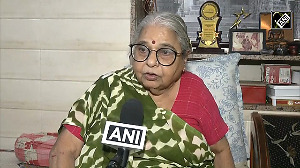Terry Pattar, an associate with JSAS, told rediff.com, "It was such a surprise attack, and I believe the security forces have reacted as comprehensively as they were able to."
"But, it does highlight that the Indian security forces lack the depth of intelligence that they do need and perhaps they are still building up their levels of expertise in counter-terrorism," he said.
Pattar bemoaned this lack of expertise because "actually India is really on the front-lines of terrorism -- it suffers lots of problems with terrorist groups throughout the country for various causes."
"There needs to be more done to boost the training and equipment levels of security forces in Mumbai particularly, and all the major cities because those are where these kinds of attacks will hit hardest," he said.
Pattar, who is also a specialist in Islamic ideologies, said the attacks "certainly indicate that there has been a high level of planning that's gone into it -- they've obviously carried out a lot of reconnaissance. They picked the right targets for their aim."
"There was a definite theme behind their targets -- attacking foreigners, Westerners in particular. So, it's not just an attack that has been quickly executed. It's taken some time to put together," he added.
Pattar said despite all of the reports and allegations of an external hand behind the attacks, especially that of Pakistan, "It's too early to say who is responsible and people should be careful not to point fingers unnecessarily. It is going to take some time before the terrorists have all been captured and interviewed and we can find out more details about the planning behind it."
He acknowledged that the reports coming out about the terrorists using rubber dinghies to come to shore off of a 'mother ship' were "certainly very interesting -- although I don't know whether that has been confirmed yet."
"But if it is," Pattar said, "It would certainly indicate that they've had quite an extensive amount of support because that again raises the bar with regard to their capabilities -- they haven't just sort of popped up on the train or anything. They've actually come in almost via the method similar to a military assault team in that sense."
He said it is unlikely the attacks were meant to ignite the volatile communal tensions between Hindus and Muslims, pointing out that "what is interesting is that had the attacks followed the kind of pattern that we've seen in the past and had they been intended to stir up communal tensions, I believe they would have attacked more prominent Hindu targets, which they haven't done. So, it suggests that there is a more international agenda behind these attacks."
Pattar said the targeting of Americans and Britishers "is more in line with more of a kind of global jihadist agenda put out by groups such as Al Qaeda. Whether they are inspired by that, whether they have direct links, we don't know yet. But it's certainly a worrying indication of a more international terrorist agenda that is being pursed by groups in India -- that it's not just about local grievances and local issues."
He acknowledged that there could be a thread that goes all the way through to the Kashmir imbroglio, the Lakshar e Tayiba as many intelligence analysts have been contending, "because we all know that for a long time there was a lot of terrorist training going on in Kashmir."
But, Pattar argued that for some time now many of these groups haven't made the Kashmir issue their bone of contention for the attacks in India and normally groups would claim responsibility for a terrorist attacks when it comes to the Kashmir issue as the grievance.
"It's a possibility there's a link, but I don't think we'll be able to confirm this until all of the information is in," he said, although he acknowledged that for all the name of Deccan Mujahideen being used, "I don't expect there's much behind it and it might be just a name they have used on the spur of the moment or in connection with this attack specifically. But, there potentially is something behind it and so it could be a group like Lashkar."
Pattar said names such as Deccan Mujahideen, Indian Mujahideen are "very generic names and it is interesting because there have been obviously some attacks directed by local groups in the past few years, and they were quite clear to try and point out what their exact grievances were."
"But this kind of attack, it seems like it's more aimed at hitting a country economically rather than say, yes, we're behind this. So, it's possible that they could be using this name as a smokescreen. But that doesn't take away from the danger posed by more local, regionalised groups that might still be active within India."
Pattar said "soft targets" like those picked by the terrorists in Mumbai "have been the terrorists' targets of preference for some time now throughout the world, not just in India. Now, we are seeing the kind of attacks that have been happening in countries such as Israel coming to India too."
"So, it's like any country that these days is facing these same problems against Islamist extremist terrorists that soft targets will be vulnerable," he said.
Pattar said, "The terrorist groups themselves sometimes distinguish between the soft and harder targets going after military targets as we see in Kashmir -- they do target military personnel and things -- but it's a harder target and groups that don't necessarily have the capability to take on military targets," would go after soft targets.





